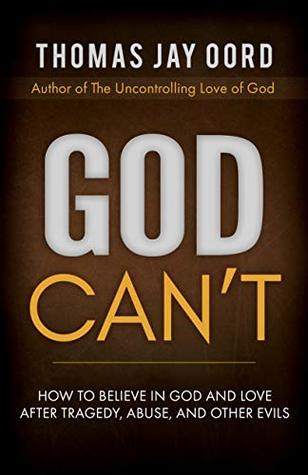More on this book
Community
Kindle Notes & Highlights
Read between
June 1 - June 26, 2020
The first is that God loves us all, all the time. God loves everyone and everything, all creatures great and small. God never stops loving, even for one moment, because God’s nature is love. God listens, feels, and responds by acting for good.
Connor Amrhein liked this
God wills our well-being, not our woe being.
God always loves, and God’s love is always good. Every idea I advocate in this book assumes God is loving.
We need to see the whole to move toward wholeness.
An uncontrolling God works lovingly to the utmost in every situation, even when horrific things occur.
“Thy name and thy nature is love.”
God’s love always works for the good, because God is love.
When I say God “can’t” prevent evil, I mean God is unable to control people, other creatures, or circumstances that cause evil. Because God always loves and God’s love is uncontrolling, God cannot control.
God’s loving nature determines, shapes, or governs what God can do.
Rather than externally limited or voluntarily self-limited, God’s nature of love directs what God does.
God does not have a divine body with which to block evil or rescue creatures.
If we can sometimes obstruct another person’s free choices, why can’t God? Here’s where “God is a universal spirit without a physical body” matters.
bodiless, universal spirit cannot do what embodied creatures sometimes can. Despite having no body, God is present and active in all situations. Divine power is direct but persuasive, widespread but wooing, causal but uncontrolling. God’s loving activity makes a difference without imposing control or using a divine body.
When we respond appropriately to God, we might say we become God’s body.
The second idea I invite you to consider is that God feels your pain. God is neither aloof nor indifferent, not a distant stepfather nor an absentee mother. God relates intimately with survivors of evil, and God feels what they feel.
As restricted people, with restricted bodies, in
A God who could singlehandedly emancipate but chooses only to commiserate is not someone to worship or to emulate!
The terminology matters less than the actual practice of careful attention to God and life.
When we continually treat our bodies and our minds harmfully, we’re not expressing cooperative faith.
worthy plan for my life in which every setback would also be a step forward.”
“My dad had been fed a steady diet of garbage about an all-powerful Father God whose will is the torture, abuse, and execution of his beloved Son,”
sin naturally results in ruin.
Teresa of Avila penned a beautiful poem
The third guarantee is that God never stops inviting, calling, and encouraging us to love in the afterlife. Although some may resist, God never throws in the towel. There are natural negative consequences that come from refusing love But these consequences are self-imposed not divinely inflicted. God doesn’t punish those who refuse this loving relationship, but God can’t prevent the natural negative consequences that come from saying “no” to love. God never sends anyone to hell, never annihilates, and never gives up calling us to embrace love. God’s love is relentless.
The lawmaker, judge, and implementer of consequences is bound by the logic of divine love. Because
I realized the Old Testament statement, “fear God,” is better phrased, “respect God.”
When we cooperate with the possibilities of love — no matter how big or small — we partner with the God of the entire universe. Everyone — in fact, every creature — makes a difference to God.
The true God of love does not cause or allow evil. The Spirit of love present to us and all creation is not morally responsible. The good news for those who hurt is that God couldn’t have
It’s important to believe God can’t stop evil singlehandedly. But it’s also important to believe God can act in powerful ways. These ways transform our lives and the world. They create and sustain existence. As we and others cooperate in loving relationships with the Lover of us all, we enjoy the well-being love provides. Our hope for good has its source in God’s love.
This God is worth worshiping!
Francois Varillon quoted in Marcel Sarot, God, Passibility and Corporeality (Kampen, The Netherlands: Kok Pharo, 1992), 78.


